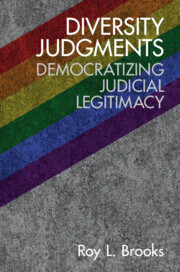Book contents
- Diversity Judgments
- Diversity Judgments
- Copyright page
- Dedication
- Contents
- Preface
- Acknowledgments
- Introduction
- Part I Asian Americans
- Part II African Americans
- Part III Women
- Part IV Latinx
- Part V Native Americans
- Part VI LGBTQ
- Part VII Intersectionality
- Part VIII Outsiders v. Outsiders
- Part IX White Males
- Part X Situational Outsiders
- 21 Gideon v. Wainwright (Right to Counsel)
- 22 Martin v. City of Boise (the Homeless)
- 23 Citizens United v. FEC (Campaign Financing)
- 24 Trump v. Int’l Refugee Assistance Project (Muslim Immigration)
- Index
21 - Gideon v. Wainwright (Right to Counsel)
from Part X - Situational Outsiders
Published online by Cambridge University Press: 10 March 2022
- Diversity Judgments
- Diversity Judgments
- Copyright page
- Dedication
- Contents
- Preface
- Acknowledgments
- Introduction
- Part I Asian Americans
- Part II African Americans
- Part III Women
- Part IV Latinx
- Part V Native Americans
- Part VI LGBTQ
- Part VII Intersectionality
- Part VIII Outsiders v. Outsiders
- Part IX White Males
- Part X Situational Outsiders
- 21 Gideon v. Wainwright (Right to Counsel)
- 22 Martin v. City of Boise (the Homeless)
- 23 Citizens United v. FEC (Campaign Financing)
- 24 Trump v. Int’l Refugee Assistance Project (Muslim Immigration)
- Index
Summary
The Sixth Amendment to the Constitution, part of the Bill of Rights ratified on December 15, 1791, provides in relevant part: “In all criminal prosecutions, the accused shall enjoy the right … to have the Assistance of Counsel.” This grant of the right to counsel departs from the English common law rule in which the right to counsel was granted in limited criminal proceedings; namely, misdemeanors and for treason and felony offenses with respect to “matters of law” as opposed to “matters of fact.” Most states in 1791 rejected the English common law rule and, like the Sixth Amendment, granted the right to counsel in all criminal matters. “It thus appears that in at least twelve of the thirteen colonies, … the right to counsel [was] fully recognized in all criminal prosecutions, save that in one or two instances the right was limited to capital offenses or to the more serious crimes.”
- Type
- Chapter
- Information
- Diversity JudgmentsDemocratizing Judicial Legitimacy, pp. 519 - 535Publisher: Cambridge University PressPrint publication year: 2022

